Keep up to date with the latest mountain lion science and learn how you can help mountain lions flourish in their native habitats.
Anyone can be a mountain lion advocate. No special skills or superhuman abilities are required! If you care about mountain lions and want to help them survive, the Mountain Lion Foundation can show you how to turn your passion into results.
Sign up with the Mountain Lion Foundation in order to:
Are you new to mountain lion activism? You want to change your local environment to improve it for cougars… but you don’t know how to start. You may feel like you are all alone, but it takes just one person to change the attitudes and lifestyles of hundreds of others. You started your search… and found this guide. That’s a BIG start! Anyone can be a mountain lion activist. It doesn’t take special skills or superhuman abilities. You just need to care enough about mountain lions to want to help them survive.
The Mountain Lion Foundation is a national nonprofit conservation and education organization dedicated to increasing understanding of and protection for mountain lions and their habitat. This organization illustrates well how just a few people can make a difference. Mountain Lion Foundation started in 1986 when a small group of friends gathered in the living room of the late poet Margaret Owings to discuss how to stop California from allowing trophy hunting on the dwindling population of mountain lions in that state. Four years later, these dedicated volunteers and mountain lion activists had placed the California Wildlife Protection Act of 1990 (Proposition 117) on the ballot. The initiative was passed by California voters, permanently banning the sport hunting of cougars in California, restricting depredation killing of cougars, and setting aside $30 million annually until 2020 for the acquisition of critical habitat for mountain lions, deer, endangered species, riparian and wetland habitats, and landscape linkages. Since that early victory, Mountain Lion Foundation activists across the nation have endeavored to protect lions wherever they may live.
The Mountain Lion Foundation receives telephone calls, letters, and e-mail messages every day from people who want to help mountain lions, but don’t know where to start. This guide provides step-by-step instructions to help individuals channel their concerns into real results.
The first thing we need to know is that you are ready to take action. Please sign up via the contact form above to receive our email alerts and learn about the various ways to help mountain lions. Glance over the categories below to get an idea of the kinds of activities that benefit cougars across the country.
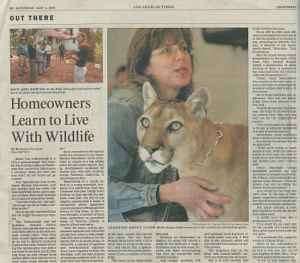
Keep track of your local newspapers, both daily and weekly, as well as other print outlets for local information. Watch local broadcast media, radio and television, to identify stories relevant to cougar
survival. One way to do this is to check the local media’s websites daily, and to do a search for the words cougar, mountain lion, puma, wildlife, hunting and depredation. Or go to Google and search the same words and phrases under their News tab. State game agencies’ webpages may also list upcoming and relevant issues.
From day to day, get to know which reporters have the wildlife, hunting, and livestock beats. Examine their points of view.
When news is breaking, remember to check all the local outlets for the story. Sometimes a timely phone call to a media outlet or journalist can bring your point of view right to the center of the story.
When a story about cougars or wildlife habitat appears, ask yourself whether the story is balanced and factually correct. Notice whether the report talked to the Mountain Lion Foundation, scientists, and local environmental organizations as well as eye-witnesses, hunters, livestock owners, law enforcement and government agencies. Contact the media outlet to determine whether there will be a follow-up story, and whether you might be able to provide additional information.
The letters section is the most-read section of the daily paper and is well read in magazines as well. Put your pen to paper!
Letters from local residents are more effective than letters from a national organization. As their reader or viewer, your thoughts and feeling carry much more weight with the media and their audience. Make sure you include your name, address, and phone number or your letter may not be printed. These details also convince editors that you are in fact a local resident.
Letters don’t have to be rebuttals or responses to published stories. You can write when you notice a problem, an issue, or a solution. You can suggest a news or feature story.
Write on good news, as well as bad. Thank the paper for its coverage of a habitat conservation effort, a story that questions trophy hunting, or a feature concerning wildlife’s struggle for survival.
Do comment when you see an unbalanced story. Write a letter to the editor asking them to focus on the bigger picture and the long range view: the role predators play in sustaining our natural environment. Give the other point of view, and don’t forget to see the situation through the eyes of the lion, you are the voice of the lion in your community.
When you see a hear a slanted or sensationalized television or radio segment, call the station and ask them to consider compiling a feature story to more thoroughly explore the threats facing mountain lions today.
Your letters or calls will cause media decision-makers to stop and consider their responsibility to inform, and publishers and station-owners to think about just how many people they might be offending.
Familiarize yourself with the letters section of your local papers on a regular basis. There is typically a limit of 200 words.
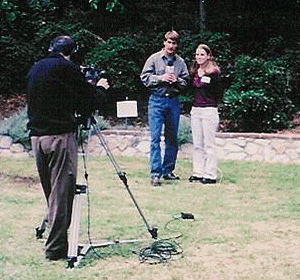
Pick the main point you wish to emphasize and make it your only point. Keep it simple, polite and direct. Mention the Mountain Lion Foundation, our website, and that our phone number is 916-442-2666 as a source of additional information. If you need help, give us a call.
Carefully follow the published guidelines for letters to the editor. Print your full name, address and phone number at the top of the letter. Sign the letter at the bottom. Whenever possible, fax or email or deliver your letter by hand. Timely letters are much more likely to be printed.
Send the Mountain Lion Foundation a copy of your letter, as well as the original story. When your letter is published or your comments mentioned on broadcast media, send a copy of the newspaper page, audio or video clip as well. We can highlight your work on our website and it may serve as a model to help other activists getting started.
In this age of instant communication, websites, blogs and forums can be as important as traditional news outlets in guiding public discussion. Community does not exist if there is no interaction.
Leaving comments on media websites that add to the discussion of a news story has become an important way to make your views known and to begin a dialogue with others in your region that are concerned about the same issues.
The media, the audience, and you can all benefit from a timely, informative, and well-placed comment. The media wins because they get lively discussions in their comments section, which brings more viewers to their site. Regular online readers often find the comments more fun and informative than the story itself. So the readers win because they are involved in a discussion on a topic that interests them, have the immediate opportunity to express their own views, and may be provided with further reading somewhere else (always include a link to your website and to mountianlion.org in your comment). You come out a winner because you have educated a wider audience and have provided greater depth, breadth, and factual information to the news story itself.
The best comments:
To change things dramatically, you must know how to communicate with influential citizens, regulators, and with appointed and elected officials at all levels of government.
First, find out who they are by looking for a list of federal, state, county, and city officials. Often local newspapers publish this information. You can also call your county’s Board of Elections, contact the League of Women Voters, or look online. You can use an online search engine to find news articles about mountain lions (don’t forget to search for the big cats by all their common names, including cougar, panther and puma), and then read the articles to discover just who influences cougar policy in your State and region.
Sometimes titles may be misleading: a local sheriff, deputy, academic researcher, or game warden may have more influence on policy than a governor or congressman, simply because he or she is considered the “go to” authority on cougars in the state.
Don’t forget that regulation can be as important as legislation. Get to know how cougars are “managed” and how cougar controversies are currently “resolved”. Appointed officials are the authorities on regulation, and a wealth of information on how to effect change beyond the ballot box.
Next, get to know as many of your elected representatives as you can. Start with your local officials, such as council members or county supervisors. Then work your way up the ladder to your national representatives. Your contact will stand out if you can communicate that you have talked with people at the local level, and listened to and understand local concerns, before attempting to persuade legislators with much larger constituencies.
It’s also very helpful to get to know and befriend elected officials’ aides, who are often much more accessible and can give you less formal responses and information.
Although it may feel uncomfortable, dropping the names of the people you have talked to, even those with whom you may disagree, enhances your credibility. It sends the message that you are open to the ideas of others and looking for win-win solutions.
Write to thank elected officials for taking time to meet with you, and follow up each time they take specific positions that you support. The important thing is to establish a rapport and have them consider you to be someone who should be contacted and listened to when cougar, habitat, and other wildlife issues arise.
Most important, be reasonable, willing to listen, well-educated on your subject matter, and open to suggestions. Don’t ever threaten or cajole. Be polite, positive, and hopeful. State your case succinctly and thank them for their consideration.
When writing to or meeting with an elected official, keep the following guidelines in mind:
When meeting with elected officials, use the following tips to make the most of your meeting:
Remember that how you communicate is as important as what you communicate. People who care about animals are often stereotyped as emotional. We can change that image by doing our homework, staying calm and polite, and keeping our statements concise.
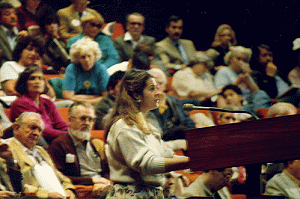 To get a sense of how conservation issues are dealt with well before your issue comes up, and to become familiar with the most effective etiquette for testimony, go to relevant commission and council meetings, regulatory or legislative sessions.
To get a sense of how conservation issues are dealt with well before your issue comes up, and to become familiar with the most effective etiquette for testimony, go to relevant commission and council meetings, regulatory or legislative sessions.
Regular attendance also helps you be known to and recognized by the people you are trying to persuade. Attend “town meetings” where elected officials meet with voters to answer questions. Attend sessions of council and supervisory meetings, and regulatory and legislative sessions whenever possible.
When it is finally your turn to testify:
BE BRIEF: A few minutes are all you are given to make your point. You are telling a story, so clearly organize your words in such a way that listeners can follow your line of reasoning to a sensible conclusion. Have a handy outline at hand, and practice before you preach!
BE YOURSELF: Tell how cougar conservation affects you, your family, your business or your neighborhood. The more personal your story, the better.
BE RESPECTFUL: Remember that people of good will can disagree with your perspective. Disagree without being disagreeable. Personal attacks on other speakers or on individuals or groups tend to backfire. Remember that you are representing the lions, and other conservationists, and that your demeanor will lead decision-makers to take you seriously, or not.
FOCUS ON THE ISSUE AT HAND: While many things affect the survival of cougars, and some may be more powerful than others, decision-makers want clear and focused information relevant to the particular decision they must make today, rather than more general background or redirection to another issue. Give them what they need to hear, not what you most want to say.
RELAX: Not everyone is used to speaking in public, and actually people are often suspicious of a speech that is “too polished”. Be natural. Don’t be nervous. Speak from your heart. Speak for the lions. Decision-makers want to hear from you!
ANTICIPATE QUESTIONS: Remember that even though your testimony time may be limited, it is often extended when decision-makers ask you for additional information. Consider such questions as an opportunity, not a challenge. Practice your prepared testimony with family and friends, and then find out what questions they may have about the issue after hearing your point of view. Prepare written answers to those questions before the meeting or hearing, and have those responses close at hand.
KNOW THE FACTS: While you may not include it in your direct testimony, be able to explain the basis for your comments and recommendations with facts, reasonable assumptions based on facts, or expert opinion supported by facts. Whenever possible, be able to refer to specific data and reliable references that support your conclusions.
BRING WRITTEN COPIES: Bring copies of your testimony, including addendums with additional information or background, persuasive graphs and charts, and references for your factual data. Be sure to have sufficient copies for each decision-maker present, as well as extras for the media, potential allies, and other interested parties.
Often, public testimony is just one part of public review of a decision. Written comments are also solicited for a variety of regulatory changes, and become part of the public record when decisions are revisited. As such, they may be more influential than the more visible meeting or hearing.
Consider formal written comments to be part of your testimony, and submit them well in advance of any deadlines. Comments postmarked after the close of the public review period may not be accepted or acted on. If necessary, fax your comments on or before the close of the review period and follow up by regular mail. Comments must be submitted in writing and must include your name and a valid physical address; email addresses alone are not sufficient. Comments may also be sent by email, but must include your name and address.
An essential part of any movement for social change is the effort to create new legislation. To do this, you must know how to communicate with your elected officials. You began this process by educating the policy-makers.
Get to know as many legislators as you can. Don’t wait until your group wants to introduce a bill. Lay the foundation before you start a legislative campaign. Establish a rapport.
Do your homework. The first solution to a problem is not always the best. Research the cougar legislation in other states. Consider whether such efforts would be effective in your state, and also whether voters would be likely to accept radical change, or whether a more moderate approach is required.
Find allies who have drafted legislation before, and get some feedback before making an appointment with a legislator who is friendly to the cougar. If your legislator is not on your side of the issue, seek out an activist constituent of a more amenable legislator to make the appointment and further your goal.
It is often better to work with staff than with the legislator. Legislative staff write most legislation, and are pros at getting a bill into law. They will help you to take your effort to the next level!
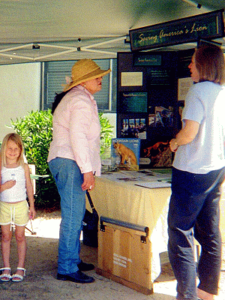 Take the time to listen to opinions about mountain lions from your friends and neighbors. Their thoughts will help you to understand public attitudes. Your responses to them will help you to refine your message. Remember: you don’t have to convince, nor do you have to agree. But to be a truly effective activist, you do have to listen.
Take the time to listen to opinions about mountain lions from your friends and neighbors. Their thoughts will help you to understand public attitudes. Your responses to them will help you to refine your message. Remember: you don’t have to convince, nor do you have to agree. But to be a truly effective activist, you do have to listen.
Seek out people whose worldviews are different from your own and you will identify the barriers which must be overcome to save America’s lion. You will also begin to build bridges in your community which may be useful in forming future coalitions. Your willingness to listen will go a long way toward convincing your community that you are acting because you care about people as well as about animals, that your opinions are well-considered, and that you are taking into account unique local situations.
The views expressed at the local pet shop will differ from those given at the feed store. The vegan cafe will differ again. However, people whose opinions are already well-defined are not the only target. Few people know much about our American lion, and sometimes overcoming their misconceptions and providing them with a few key facts about the biology and behavior of mountain lions will transform them into ambassadors, who will also spread the word.
The roots of local antagonism toward lions are often a surprise. Here are few examples:
These examples are just a few of the many surprises that we’ve discovered. You will find your own. You can easily see that sometimes the most useful knowledge about communities can only be found through careful sleuthing, along with a healthy dash of serendipity.
When you learn the real reasons that people want to kill lions, you’ll be able to suggest solutions that address their specific concerns and achieve your own goals for lions at the same time.
And while communities differ, lions share common behaviors throughout their range, and we can save time and money by not requiring every activist to learn from scratch. Communicate with activists in other communities, and consider using their model to pilot your own project.
Closer to home, beyond asking people’s opinions about killing lions, ask what they would do to solve the problems they see. Dig deep. When people tell you that other methods simply don’t work, and that the only option is to kill the lion, you can respond with good research to demonstrate that killing the lion seldom works, so it makes sense for all to consider looking for an innovative solution. Here are some examples:
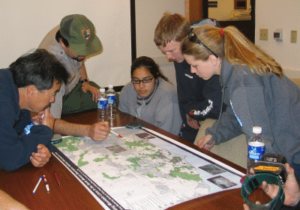 It is the great irony of activism — and also its magic — that while each and every person is needed, the most dramatic and effective change can be achieved when people work together as a group. It is not just that many voices are louder, but instead that harmony is so compelling.
It is the great irony of activism — and also its magic — that while each and every person is needed, the most dramatic and effective change can be achieved when people work together as a group. It is not just that many voices are louder, but instead that harmony is so compelling.
In each of the examples, people who you’d expect to be at odds came together and achieved results by sharing ideas that went far beyond the obvious. The stories — of thorny problems to be solved, unlikely allies, and unexpected solutions — make it possible to present the possibilities to a broader audience, and to engage their imaginations!
If this kind of collaboration appeals to you, contact the Mountain Lion Foundation and connect with others who hope to Save America’s Lion.

Set Aside the Time. Slow and steady is the best bit of advice for would-be activists. It's more important to be well-informed and to make good decisions about how best to contribute than it is to immediately begin a large campaign. Take the time to consider your schedule and to be realistic about what you can do for lions over the coming year.